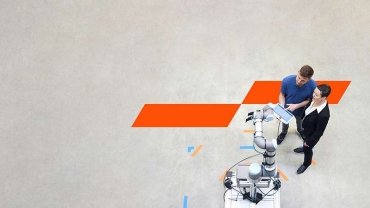
The tax expert of the future is a partner of AI
18/10/23
Against the scenery of the Amsterdam IJ, at the Eye Film Museum, tax directors gathered last week to explore how Generative AI (GenAI) is shaping the future of their profession.
The State of Tax Seminar opened with an inspiring speech by Professor dr. mr. Lokke Moerel, Professor of ICT Law at Tilburg University. This authority on digitalisation, strategy and cybersecurity spoke about the impact of GenAI on our society and organisations. She explained that GenAI requires user involvement and judgement at various levels to ensure that the results generated are accurate and useful. On the input, on the rules of the algorithm and on the output.

Generative AI involves the training of models to generate new data similar to the data they were trained with. This can be applied in text, code, image, audio or video. Giving a GenAI tool a proper command prompt gives you highly accurate answers and, with some practice, even enables you to proactively respond to potential tax challenges.
The importance of human supervision when using GenAI
Human supervision is important when using AI, for one thing to check that the input data is correct, clean and relevant to the purpose. It is also important to realise that algorithms take into account the assumptions provided by the designer. It is therefore important to keep in mind that the quality of the results depends on the assumptions of the model. Finally, there will be need for human supervision of the output, with identification of any errors.
Responsible usage possible
Professor Moerel then recommended controlled experimentation, especially with low-risk use cases where tasks are related to routine, repeatable activities. She encouraged the audience to embrace GenAI as soon as possible and not to be too conservative when exploring it within fiscal departments. It is vital to think and act big now to exploit the full potential of GenAI.
Practical applications of GenAI
In engaging break-out sessions, participants were then able to dive deeper into the practical applications of GenAI. In one, Ronald van Scharrenburg, chairman of PwC's litigation practice, Pieter van der Vegt and Simon Cornielje, two PwC tax experts, joined participants to discuss the impact of GenAI on the jurisdiction. They covered some topics related to AI and jurisprudence, such as capacity issues, evidence judgements, questions of law and legal development. It was recommended to use AI in simple cases, term issues and improving the content of judgments, especially in the case of draft decisions.
GenAI's impact on tax expertise
For tax professionals, AI tax consulting is already on the rise. AI applications are expected to take even more work off their hands, freeing up more time for assessing complex tax matters and building relationships with internal and external stakeholders. There is also a downside. Relying too heavily on GenAI to solve tax issues could lead to a decrease in in-depth tax knowledge that is ultimately needed to make a judgement call.
It is important to find a balance where GenAI is used as a tool to increase efficiency and automate routine tasks, while at the same time recognising and maintaining the need for in-depth tax knowledge and expertise. This works best if professionals continue to learn and adapt to technology to benefit from the best of both worlds.
The second breakout immersed participants in the digital world of GenAI. The presentation highlighted the importance of GenAI in the tax world and offered insights into how tax professionals can learn to work with GenAI.
PwC's Hans van der Leeden talked about how we are investing in AI technologies and scaling up AI applications to support clients. By working with leading companies and technology experts, PwC is able to develop and implement AI solutions for a variety of application areas and business needs.
ChatPwC and Harvey
GenAI has the potential to transform taxation. PwC uses ChatPwC and Harvey. ChatPwC uses AI technology to answer questions, analyse documents and manage knowledge. Harvey, built on OpenAI technology, leans on a less broad tax-legal data model and is therefore well suited for tax-legal issues. PwC partner and AI specialist Mona de Boer ended by calling for a successful living lab that focuses on learning, setting ground rules and maintaining individual quality. The success of deploying GenAI systems depends on how organisations succeed in this and are willing to change.
What does this mean for you?
It is important that tax professionals learn to work with GenAI. Enabling training and continuing education to upskill on GenAI is a necessary next step in this process.
The key insights from the State of Tax Seminar rely on the following facts:
- GenAI is powerful but not perfect. It is important to understand GenAI's strengths and weaknesses and build in controls to ensure accuracy and security.
- GenAI can support and improve almost every aspect of your tax function.
- GenAI must be used responsibly. A strict framework for responsible AI is crucial to manage risk.
Whether you already call yourself a believer, or are still hesitant to get started with it, one thing is clear: GenAI has the potential to transform and strengthen your tax function. It is an opportunity to increase efficiency, prepare your team for the future and encourage broad data access.
At PwC, we strive for a future that combines human ingenuity with technological power. Human-led, tech-powered we call it. We understand the critical importance of trust, ethics and collaboration in this new era of technological advancement. We invite you to explore the possibilities of GenAI.
State of Tax Seminar
Watch the impression video of the seminar here.
Contact us


Partner, member Tax & Legal board, PwC Netherlands
Tel: +31 (0)62 040 22 91

















